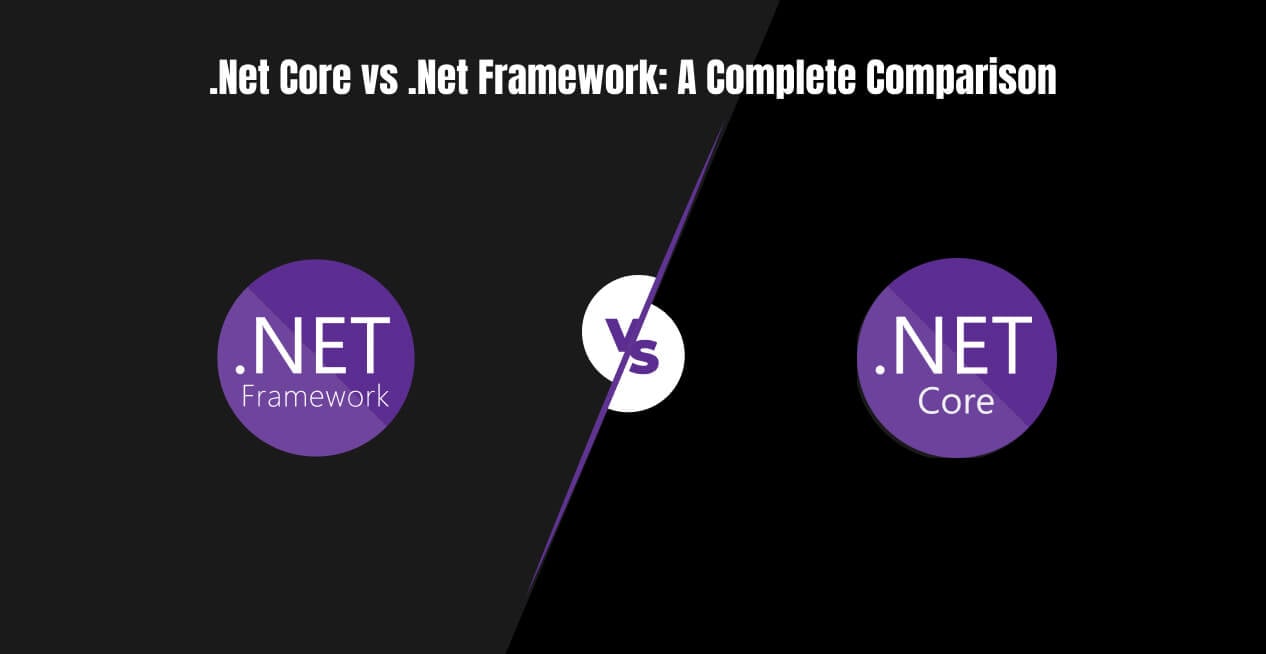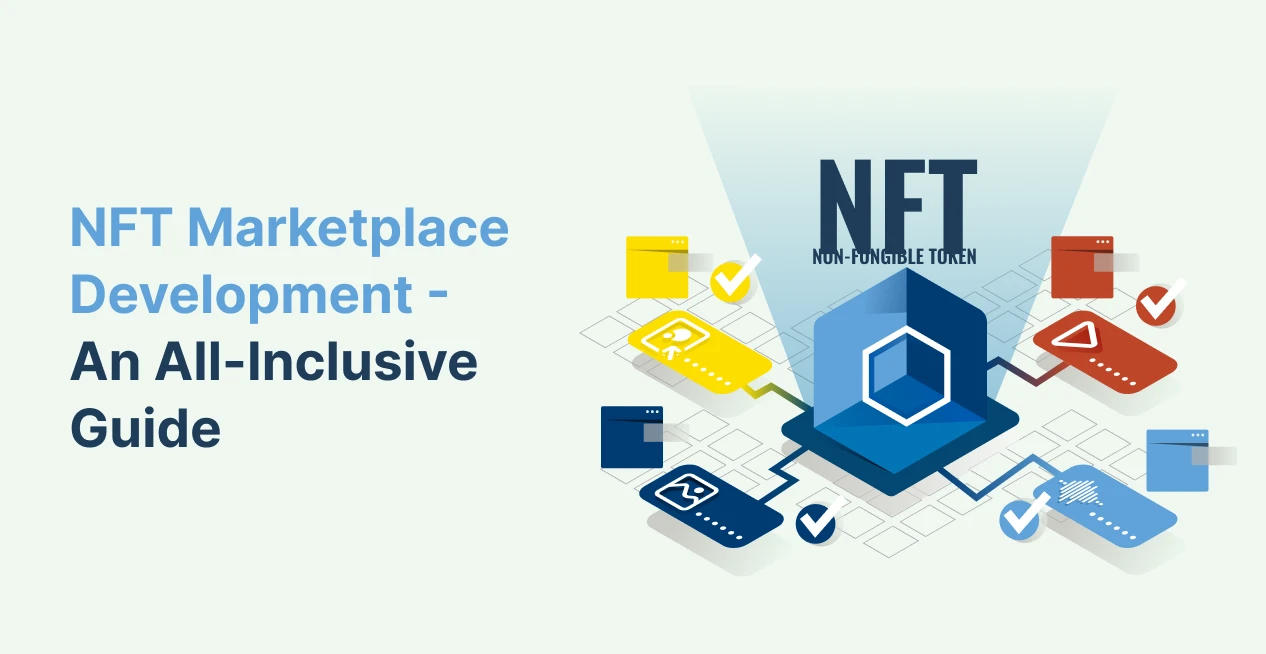-
What Is .Net Core Vs .Net Framework
- What is .Net Core?
- What is .Net Framework?
- Advantages & Disadvantages of .Net Core
- Advantages and Disadvantages of .Net Framework
-
.Net Framework vs .Net Core: Quick Comparison
-
Net Core vs .Net Framework: Key Differences
-
.Net Framework Vs .Net Core: Similarities
- .Net Core Vs .Net Framework: Which is Better?
-
.Net Core Vs .Net Framework: Final Thoughts
- FAQs: .Net Framework Vs .Net Core
What Is .Net Core Vs .Net Framework
.Net Core vs .Net Framework – Which run-time should be used when creating software applications is a question that has been debated for a long time. Many individuals and businesses are curious to know about the aspects of these Microsoft inventions.
Like, how is .Net Core different from .Net Framework? Should I need to migrate from .Net Framework to .Net Core? This article will explain the meaning, its benefits, drawbacks, and similarities. We will also untangle the fundamental differences between .Net Core and .Net Framework.
We make it easy for you to choose one from .Net Core and .Net Framework for software development. Let’s begin with an overview of .Net Core vs .Net Framework.
What is .Net Core?
.Net Core is a cross-platform version of .Net, a free development and open-source platform maintained by Microsoft. .Net Core is used for developing websites, consoles, and services apps. It runs on Windows, Linux, and macOS operating systems.
The Framework of .Net Core can be used to develop various types of applications like desktop, web, mobile, cloud, Internet of Things, microservices, etc. It is built to be scalable, light, and quick. It has all the components required to run the fundamental functions. .Net Core provides several functionalities, such as NuGet packages, that you can add to your application as needed. In this way, the .Net Core applications speed up the performance, making it easy to maintain and reduce the memory footprint.
Characteristics of .Net Core
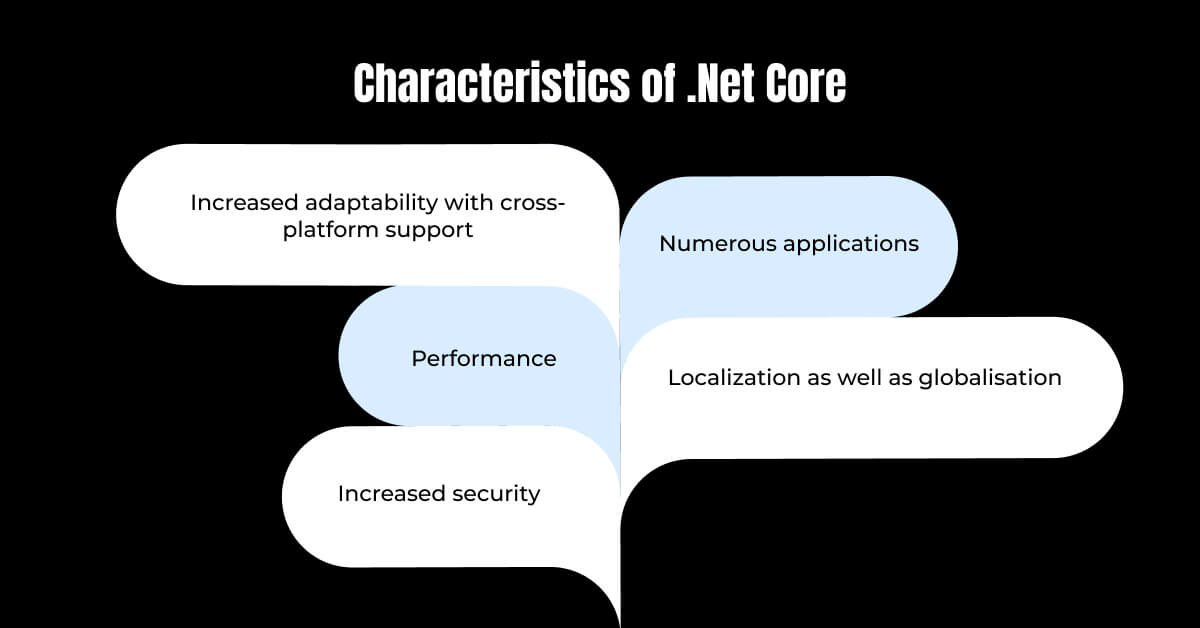
1. Increased adaptability with cross-platform support
With the help of .Net Core, the applications can be used with Windows, Linux, and macOS. .Net Core is the greatest alternative for any organization that has to reach a wide range of customers, users, and technology. We can create and maintain various platform apps with .Net, which gives enterprises additional flexibility.
2. Numerous applications
The .Net Core Framework can be used to create several apps in addition to cross-platform ones. On .Net Core platforms, you can build and run web, mobile, desktop, IoT, gaming, AI and machine learning applications.
3. Performance
Through namespaces, the CLR environment minimizes software development conflicts, encourages safe code execution, eliminates performance bottlenecks, and prevents versioning disputes through assembly manifests.
4. Localization as well as globalization
With the help of .Net Core, localizing data within a dot net application is easy. If you want to use your application all around the world, localization is a must.
5. Increased security
Numerous security mechanisms are available with .Net Core. Data protection, threat prevention, authentication and authorization mechanisms. So, basically, .Net Core has everything you need.
Why use .Net Core?
What are the main benefits of using .Net Core for application development? The most significant ones that are relevant to backend and service-based architectures are shown below.
1. It’s multi-platform
.Net Core is Microsoft’s first cross-platform language. The term “cross-platform” is used to signify that it could be used with any Windows version. Nowadays, the code written in .Net Core can run on different operating systems like Windows, Linux, or MacOS, which offers considerable advantages over its predecessors and facilitates deployment as well as scalability.
2. Portable
.Net Core is portable. An API or app built in .Net Core language can be relocated to another container or even to a different platform to continue functioning without any issues. Infrastructure and code are no longer as tightly coupled as before.
3. It is fast
Several tests that .Net Core performs are up to 8 times better than other languages, and businesses can save much money using it.
4. It is constantly improved through community contribution
It seemed unimaginable a few years ago for the community to develop a Microsoft-sponsored language in an open approach. More than 10,000 developers have contributed to the various Microsoft GitHub repositories (about 105 of them were Microsoft employees). Undoubtedly, that is a groundbreaking communal effort.
5. It is perfect for use in containers
Microservice architecture frequently uses containers in collaboration with it. Although .Net Framework can use Windows containers, .Net Core is better for containers because of its adaptability and lightweight.
Now, you know when to use .Net Core. If you still need clarification about what to choose for your application, you can take the help of dedicated developers to figure it out for you.
What languages are supported by the .Net Core?
.Net apps can be developed in C#, F#, or Visual Basic.
- The programming language C# is simple, modern, object-oriented, and type-safe.
- Programming languages like F# make it easy to create simple, reliable, and performant code.
- It is simple to build type-safe, object-oriented software with Visual Basic, an easy-to-learn language.

What is .Net Framework?
.Net Framework is a Windows-specific version of .Net. It is a software development platform specially designed to build Windows-based applications. The first version was developed back in 2002 by Microsoft. Since then, .Net Framework has become a significant part of developing custom applications for businesses around the world.
The .Net Framework has its set of developer tools and class libraries. It is related to .Net, a developer platform used to build apps across various operating systems, including desktop, mobile, web, servers, and the Internet of Things (IoT). It works with many popular programming languages and can be used to build apps for various platforms. The .Net Framework can basically create three types of applications: Form-based, Database-based, and Web-based.
Characteristics of .Net Framework
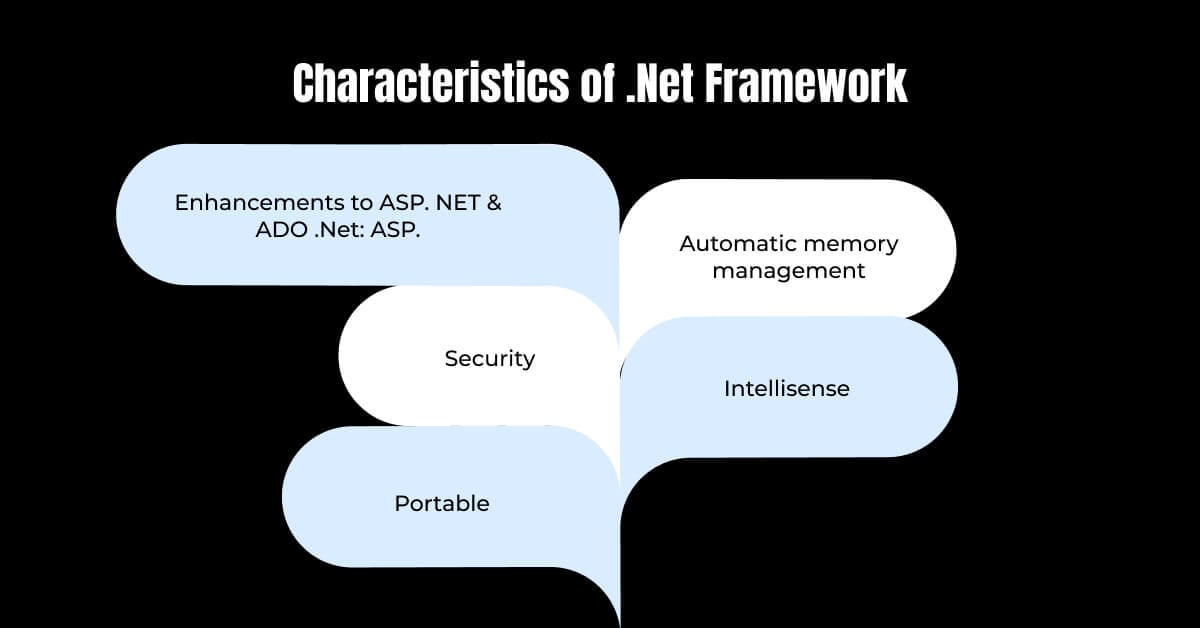
1. Enhancements to ASP. NET & ADO .Net: ASP
.NET & ADO.Net is a subset of the.Net Framework, which enhances these technologies.
2. Automatic memory management
Developers had to keep an eye on system resources like memory while creating programs, but .Net eliminated this concern by managing memory independently. The garbage collector releases unused objects at regular intervals.
3. Security
The Windows platform has long been criticized for its weak security features. However, the .Net platform is designed to be secure and reliable for business applications, including code access security, type safety, and other security features.
4. Intellisense
The .Net IDE features the Intellisense function, which assists in code compilations that are carried out automatically. It helps in minimising typographical errors and impacts.
5. Portable
The .Net Framework offers a platform for writing portable programs in various .Net environment languages built on open Internet standards. That enables various hardware, software, and application types to cooperate across a large and dispersed system of networks.
Why use .Net Framework?
1. Platform independence
Any application can be created using .Net on any platform. Therefore, it is platform-independent. .Net offers every solution imaginable for building mobile apps for various operating systems, including Android, iOS, Windows, and others.
2. Support for languages and simple deployment
According to research, .Net presently works with 44 different languages. You can use whatever language you like in your application. The ease of deployment of .Net is an additional benefit. Since it contains library class files, it provides resources for application development.
3. Best architecture and user-friendly interface
.Net is an open-source platform that utilises an IDE (Integrated Development Environment), which is efficient and dynamic when developing applications. Create a practical application using the best-in-class MVC (Model-View-Controller) architecture, an intuitive user interface, and superior UI controls.
4. Improved performance
.Net Framework offers a responsive result thanks to its high speed, just-in-time compilation, and higher performance. Adaptable procedures and a dynamic user experience will make you happy.
5. Security, reliability, compatibility, and scalability
.Net Framework is a highly secure Framework to deliver safe applications. .Net is consistently dependable, and you can rely on it. Because it is interoperable, you can utilize the same code and system components for different system tasks. .Net Framework is faster loading, more scalable, and most robust in any situation.
What languages are supported by .Net Framework?
Applications for the.Net Framework are created in C#, F#, or Visual Basic and are then compiled into Common Intermediate Language (CIL).

Advantages & Disadvantages of .Net Core
Although .Net Core is dependable, simple to use, and offers many advantages when utilized in application development, it is not yet appropriate for all development issues and circumstances. Let’s check out the pros and cons of .Net Core.
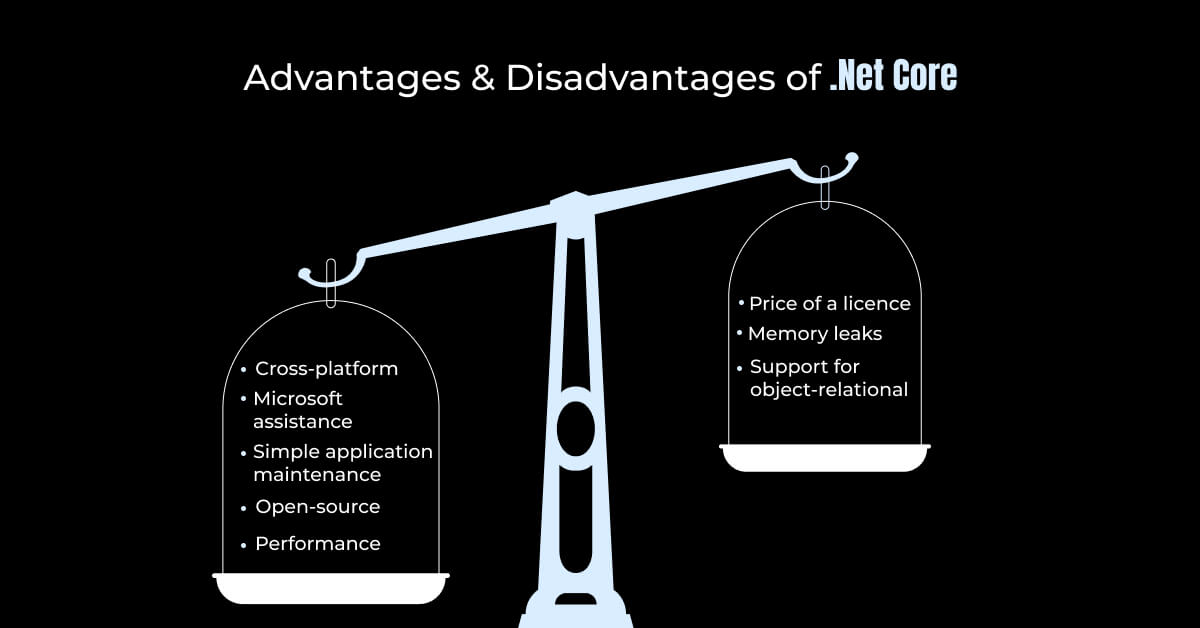
Advantages of the .Net Core
1. Cross-platform
Unlike in the past, choosing the Microsoft Framework does not automatically mean adopting the Windows Server or Azure infrastructure. It can be hosted on Linux, AWS, or Google Cloud. Windows, macOS, and Linux are all compatible with .Net Core. Other OSes can also run it.
2. Microsoft assistance
Microsoft offers support for .Net Core. Investments made in .Net-based apps over the long term are secure and affordable, thanks to the help of a reputable company.
3. Simple application maintenance
Because C# is a strongly typed language, development tools can find the majority of flaws early on. Intellisense in Visual Studio assists in supporting the project’s code base. It streamlines new developers’ involvement and facilitates their seamless transition into a project.
4. Open-source
.Net Core platform is open-sourced. Any developer can add to a Framework that speeds up Framework development and raises overall quality.
5. Performance
It is easy to use asynchronous programming techniques with .Net Core. Most third-party libraries and most widely used .Net classes now support async. This all improves the performance of the Framework.
Disadvantages of the .Net Core
1. Price of a licence
Although .Net is an open-source technology, its total cost of ownership is still costly. Project expenses can quickly increase with the addition of the Visual Studio IDE component, additional quality assurance services, and communication capabilities. Despite the fact that .Net Core can be used on Mac and Linux computers, Windows for .Net engineering requires additional licensing.
2. Memory leaks
This is a widespread issue with practically every technology since the Framework occasionally fails to free up memory that is no longer required. Regarding memory-related issues like memory leaks, .Net Core has a negative reputation. It requires more time and effort from developers who work within it to manage resources properly.
3. Support for object-relational
The approach is based on objects and data rather than actions and logic because .Net Core employs an object-oriented programming language. Some programmers think the Framework supporting this data orientation needs to be revised and might only keep some database designs.
Advantages and Disadvantages of .Net Framework
There are several reasons why so many developers adopt the .Net Framework and the .Net family. There are, however, several drawbacks to consider as well. For further information about them, read on the advantages and disadvantages of the .Net Framework stated below.
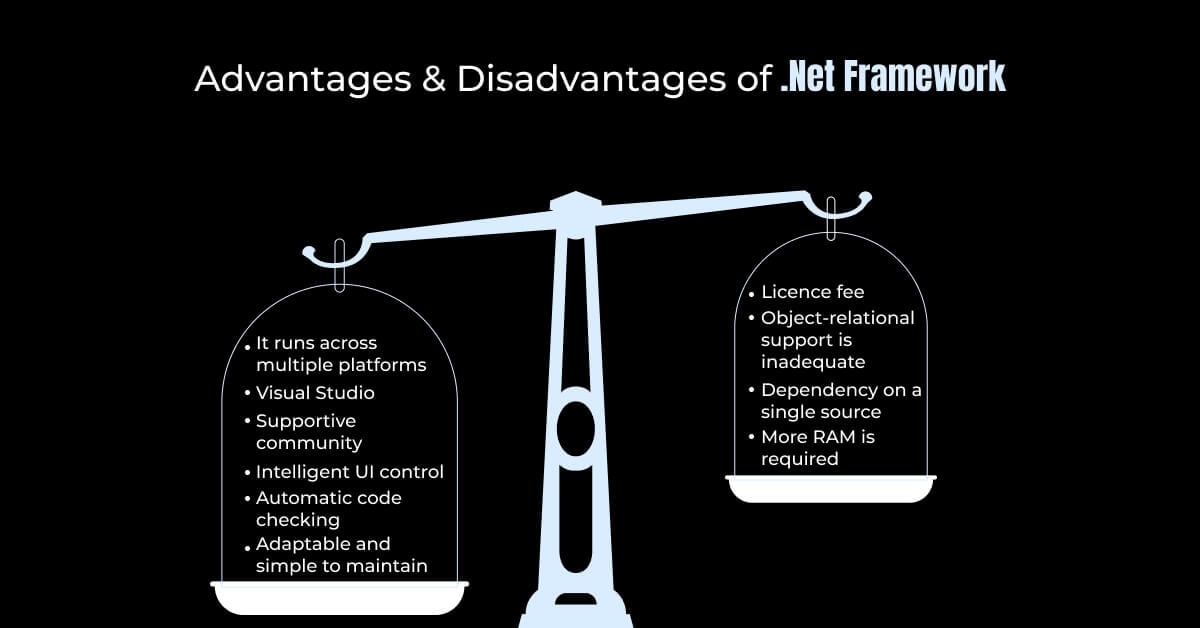
Advantages of the .Net Framework
1. It runs across multiple platforms
The primary advantage of utilizing the .Net Framework is the capacity to create code that functions on various systems. Because the code is open-source, it has been improved and is now more advanced.
2. Visual Studio
Microsoft’s Visual Studio is an Integrated Development Environment (IDE) for creating, testing, and publishing apps for various platforms, including iOS and Android. Integrating Development Environments simplifies the process of developing applications by giving users the tools they need to create and test software.
3. Supportive community
There is a sizable army of developers who support and love .Net. Businesses of all sizes and financial capabilities prefer this Framework. Being an open-source technology, it continues to gain popularity. There are many communities, so you can seek advice from more experienced coders to advance your abilities.
4. Intelligent UI control
Microsoft offers a .Net Framework and a sophisticated internal UI. Its goal is to improve the application’s appearance and quality. Additionally, it enables third-party approval controls to enhance the developed product. One of the third-party controls, Telerik, greatly simplifies drag-and-drop operations and saves developers valuable time.
5. Automatic code checking
Writing code is a difficult process. Even if you are the best developer, mistakes will inevitably happen. If an error occurs accidentally, the entire project suffers. The .Net platform has the feature of automatic monitoring and verification to prevent this.
6. Adaptable and simple to maintain
The .Net Framework boasts a wide array of effective development tools. They speed up all operations. It is simple to maintain and debug the code. It allows it to break down apps into little modules for in-depth study. Businesses can boost their commercial performance with the help of the Sitecore tool.
Disadvantages of the .Net Framework
1. Licence fee
Although the .Net Framework is open-source, licensing can occasionally be pricey for large and complicated projects. Microsoft provides a variety of tools to help you with your work. Working with Visual Studio IDE is one of the most expensive things. There are better platforms to think about in terms of price.
2. Object-relational support is inadequate
Object-relational programming (OOP) in .NET is called the Entity Framework. It has been argued that this framework is not flexible enough for new database designs because it may not support them.
3. Dependency on a single source
Microsoft owns the .Net Framework. It shows that this organisation completely outclasses this Framework. As a result, the developers are subject to Microsoft’s rules and do not have complete and exclusive control over the application.
4. More RAM is required
.Net apps are typically small, but when such programs are launched, so are the Microsoft .Net Framework tools, which take additional RAM. According to the Framework version, there is a “weight” increase of 20 MB.
.Net Framework vs .Net Core: Quick Comparison
| .Net Core | .Net Framework |
| .Net Core is built for Windows, Mac, OS, and Linux. | .Net Framework is built for Windows only. |
| It is compatible with web Pages, Web AP, and MVC. | .Net Framework is compatible with Web Forms, Web API, Web Pages, and MVC. |
| With Visual Studio for Mac and Visual Studio Code, you can develop in C# or F# | You can develop with Visual Studio using C#, VB, F# |
| Great performance than .Net Framework | Performance Gap |
| Open-Source and Cross-Platform Framework | Mature Framework |
| Builds modern, cloud-based apps | Builds server-based web apps, and enterprise-grade apps |
| Runs on both .Net Core and .Net Framework | Runs on .Net Framework |
Net Core vs .Net Framework: Key Differences
| Basis of Comparison | .Net Core | .Net Framework |
| Compatibility | In .Net Core vs .Net Framework discussion, the .Net Core has cross-platform compatibility. This helps developers follow the “build once, run everywhere” concept as well as migrate apps across different platforms. | .Net Framework enables programmers to create applications for a single platform, namely Windows. It has language compilers that facilitate writing code in one language, converting it, and utilizing it with code written in other languages. |
| Performance and scalability | In terms of performance and scalability between .Net Core vs .Net Framework, .Net Core enables you to improve app performance without using any hardware. | The performance of the .Net Framework is unsatisfactory. Flexibility, security, and speed are minimal. |
| Deployment model | Existing apps automatically get .NET Core updates. The procedure has no impact on the application’s functionality. | The Internet Information Server is the first place where updates to the .Net Framework go live. Therefore, each program will need to be manually updated by the person in charge of keeping them all up to date. |
| Focus on devices | In today’s highly advanced digitized, tech-friendly world, regardless of the business domain for the application, it is crucial to develop an app that can reach various markets and end users while utilizing the latest technology. With .Net Core, developers can build apps across a variety of industries, including gaming, mobile, IoT, and AI, through regular updates that adapt to new opportunities. | In contrast, the .Net Framework is limited to Windows OS only. |
| Source | .Net Core is a great option for developing enterprise apps since it offers a large range of useful capabilities, including source control, project management, testing, and debugging. | Microsoft initially made it available as a proprietary and licensed Framework, but shortly they added new components and created the open-source .Net Framework. |
| Support for microservices and REST services | WCF (Windows Communication Foundation) services are not supported by .Net Core. Hence in order to develop microservices, a REST API must always be created. | On the other hand, the .Net Framework gets an advantage from WCF support and also supports REST Services. Although it is less efficient in terms of performance and scalability as it does not support the development or deployment of microservices. |
| Security | Regardless of the lack of Code Access Security, .Net Core is a safer option since it makes use of a more flexible and contemporary security model. | .Net Framework makes use of Code Access Security and the Windows security model, both of which are updated by Microsoft with the most recent security patches. |
| Packaging and shipping | Through the NuGet package manager, .NET Core is packaged and distributed independently of the underlying operating system. | In contrast, .Net Framework needs to be installed as a single package for Windows. |
| CLI tools | .NET Core provides a lightweight cross-platform Common Language Infrastructure (CLI), with a choice to switch to an integrated development environment (IDE) like Visual Studio. | The .Net Framework features CLI tools, allowing programmes created for it to be translated into Common Intermediate Language (CIL) code rather than directly into machine code. |
| Application types | .Net Core is highly useful for creating web apps, ASP.Net Core apps, and Universal Windows Platform applications. .Net Core is not for developing desktop apps which is a drawback. | When comparing .Net Core and .Net Framework in terms of the scope of app models, the .Net Framework supports building Windows Presentation Foundation, Windows Forms, and ASP.Net. |
| Library collection | In addition to the class libraries, .Net includes CoreCLR, a rewritten version of the common language runtime. It offers developers the flexibility to select and use only the libraries required for their specific apps. | As a comparison of .Net Core vs .Net Framework, .Net Framework apps are able to utilize in-built class libraries that facilitate basic functions such as database interaction, XML document manipulation, and graphic rendering. |
.Net Framework Vs .Net Core: Similarities
The developer tools, programming languages, and libraries required to create Windows programs are included in the .Net Framework. The goal of .Net Core is to enhance application development by making it more modular, cross-platform, and flexible. But they do share several things:
- The same base class library
- A shared API, .Net Standard
- Support for Windows and Windows Server
.Net Core Vs .Net Framework: Which is Better?
You should choose .Net Core if you:
- Want to target a wider range of OS systems with your apps (Create once, run anywhere)
- Require scalability and/or high performance
- Are just starting to learn .Net
- Use Docker containers and/or microservices and prefer open-source
- Require side-by-side installation
The .Net Framework is a better choice if you:
- Don’t have time to study new technology because you already know it or have a team with .Net Framework knowledge.
- Prefer a stable system over one that is constantly upgraded and changed.
- Have more frequent release dates.
- Have a .Net Framework application that needs its functionality to be expanded. (vs. migrating it)
- Are using Windows Forms or WPF for developing Windows client applications.
.Net Core Vs .Net Framework: Final Thoughts
Undoubtedly, the debate about .Net Core vs .Net Framework will stay. Both offer progressive solutions that are exceptional in their specialized domains. However, Microsoft always tries to improve both platforms. Despite all the “buts,” “ifs,” and “nos,” the .Net industry has a brighter future than ever. Hence, we advise you to base your choice on the scope, needs, and budget of your project.
Still, confused about which technology to choose for your project? You can discuss this with our experts at OpenXcell. Hire our .Net developers to create the ideal application for your company’s objectives.

FAQs: .Net Framework Vs .Net Core
1. Does .Net Core have a future?
.Net Core seems to witness a rise with every passing year. Because of this, pursuing a career in the .Net stream would enhance your coding skills and make you versatile. Nevertheless, there are other markets that can be in direct competition with this.
2. Is .Net 5.0 Framework or Core?
.NET 5.0 is a .NET Framework that will replace .Net Framework, .Net Core, and Xamarin with a single unified platform.
3. Is .Net Core replacing .Net Framework?
The answer is no. The .Net Framework won’t be discontinued. The Framework is the result of 20 years of software development and coding. It is not totally possible to run all of those programs and tools on .Net Core. Although .Net Framework receives only bug fixes and upgrades, .Net Core continues to receive updates from Microsoft. Each has benefits and drawbacks.
4. Is .Net Core good for startups?
Yes, .Net Core can be ideal for startups. .Net’s platform is strong since it is built on the Common Language Infrastructure (CLI). This characteristic enables .Net developers to create software that operates faultlessly in any setting or OS. Along with substantial assistance from Microsoft, .Net also provides a range of IDEs (Integrated Development Environments) appropriate for various project types. This enables startups to handle all of their software requirements under one roof by simply hiring a single developer team.
5. Why is the .Net Core faster than the .Net Framework?
. Net Core was rewritten with a focus on creating a modular, light framework, changing features and compilation methods for better performance. Along with this, .Net Core is compatible with more modern languages and libraries.


